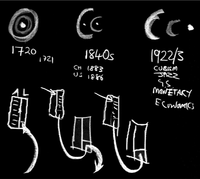
With its many and wide-ranging implications for modern economic life, associative economics places human beings at the centre of all economic processes. Our capacity to be both free and responsible means we can make conscious what is otherwise left to the unseen working of market forces. Likewise, we can regulate our own behaviour without recourse to the state.
Owing much to the observations of Rudolf Steiner, the Austrian ‘renaissance man’ whose seminal work was concerned with the advent of global economics, associative economics takes full account of wide-ranging views from Aristotle to Adam Smith, Karl Marx to Maynard Keynes and Milton Friedman, as well as the ‘sustainability critique’ and the sophistications of modern finance.
Associative economics is about the shift from competitive, national economies to the inherent dynamics of a single global economy – a change that could have been made earlier in the 20th Century and still could be today, if the underlying causes of the world’s growing inequities are to be addressed. Insofar as associative economics derives from the work of Rudolf Steiner, key texts by him and their subsequent elaboration can be found on the website of the Economics Conference of the Goetheanum, part of the Social Sciences Section of the School of Spiritual Science, which has its world centre in Switzerland.
